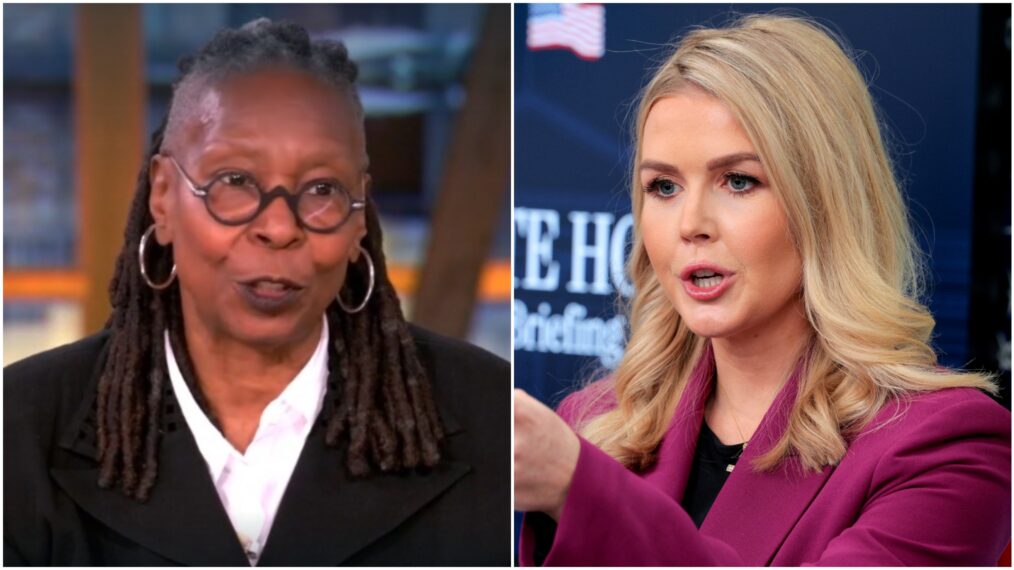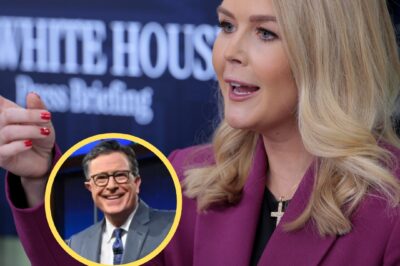On Tuesday night, what began as a routine political segment on The Five unexpectedly ignited a cultural firestorm—one that leapt across partisan divides and set social media ablaze. At the center of it all stood Karoline Leavitt, the newly appointed White House press secretary, whose confident delivery and sharp wit turned a few unscripted seconds into a defining media moment.

In under 40 seconds, Leavitt did what few would dare: she challenged The View’s media influence, directly called out Whoopi Goldberg by name, and delivered her message with a potent mix of clarity, irony, and unflinching poise.
The result? Applause and outrage in equal measure. Headlines. Hashtags. Millions of views. And a nation left asking:
Was this fearless honesty—or a rhetorical line crossed?
How It Started: When a Talk on Media Bias Got Personal
The segment began as a familiar Fox News discussion about declining trust in legacy media. Leavitt, now serving under Donald Trump’s second administration, was brought on to offer insights into the shifting tone of public discourse.
But when Jesse Watters posed a question about The View‘s influence on political perception, Leavitt didn’t hold back.
“Well, Whoopi Goldberg—who can barely keep a straight face on her own show—is suddenly offering political advice to the nation?”
“If I wanted a daily dose of uninformed chaos, I’d turn on The View… oh wait, I already do.”
Her delivery was cool, calculated, and laced with bite. The studio fell silent—then erupted in laughter.
Some co-hosts smirked. Others sat wide-eyed. Leavitt? She didn’t blink.
Beyond the Snark: A Strategic Critique of Media Culture
What could’ve ended as a viral jab quickly evolved. Leavitt shifted gears, recentering the moment as a critique not of people—but of platform.
“It’s not about disagreement. It’s about format. The View doesn’t exist to inform—it exists to incite. It rewards heat over clarity, and that’s dangerous in an election year.”
This pivot reframed her remarks from personal attack to structural observation. But the digital spark had already caught flame.
Within minutes, clips spread across X (formerly Twitter), TikTok, and YouTube. By morning, the combined views had surpassed 8 million, with hashtags like #KarolineUnfiltered and #TheViewClapback dominating trending charts.
The Fallout: A Country Reacts

To supporters, Leavitt’s words were long overdue.
“Karoline said what millions have been thinking,” tweeted conservative pundit Allie Beth Stuckey.
“She dismantled The View in one sentence—and with a smile,” praised a TikTok user with over 250k followers.
Political strategist Charlie Kirk hailed it as “the Gen Z conservative moment we’ve been waiting for—clear, unapologetic, fearless.”
But not everyone was impressed.
The View Fires Back—Subtly, But Sharply
By the next morning, The View addressed the controversy—indirectly. Whoopi Goldberg didn’t mention Leavitt by name, but her message was unmistakable:
“When people say things about this show without ever having sat at this table, it says more about them than us.”
Joy Behar chimed in with a measured swipe:
“We’ve been on the air 27 years. We’ve seen louder people come and go.”
Sunny Hostin, however, offered the most pointed response:
“There’s a difference between critiquing media and belittling women for using their voices. I expected better.”
That comment reframed the conversation again: Was Leavitt critiquing media—or undermining women?
The culture clash had now become a gendered one.
Experts Weigh In: Sharp Commentary or Staged Confrontation?
The commentary world was sharply divided.
Journalist Molly Ball called the segment “a staged hit wrapped in sarcasm,” accusing Fox of prioritizing confrontation over clarity.
Others disagreed.
“This wasn’t trolling,” said journalism professor Brian Karem. “It was a polished critique. If progressive media can roast Trump surrogates, they should be ready to take it, too.”
Even CNN’s Erin Burnett offered a surprising nod:
“Leavitt spoke with the kind of rhetorical discipline most press secretaries take years to master.”
One thing was clear: her words landed—and stuck.
The Internet Weighs In: Comedy or Communication?
Online debate was fierce, and oddly unified in one thing—engagement.
“Poised, pointed, and hilarious. She crushed it.”
“Mean-spirited and beneath the office of press secretary.”
“If The View dishes it out, they should expect it back.”
“Finally, someone said what we’ve all been thinking—but with style.”
Beyond the back-and-forth, the moment touched something deeper: a growing fatigue with media that feels more theatrical than thoughtful.
Karoline Breaks Her Silence
Two days later, on a New Hampshire radio interview, Leavitt finally addressed the storm.
“I’m not here to attack people. I respect that The View has its audience.
But when that platform consistently frames conservatives as threats or clowns, we see through it.”
Then came the line that went viral again:
“I was hired to tell the truth—not win a popularity contest.”
The Bigger Question: Can Political Commentary Survive Unfiltered Honesty?
In a world where political media often favors heat over substance, Leavitt’s moment felt like both: sharp and strategic, funny yet focused.
Critics of The View argue that its casual banter dilutes real discourse. Defenders insist it’s a rare space where women lead political conversation with authenticity.
But both sides admit: Leavitt struck a nerve.
What This Means for Karoline—and for the Future of Conservative Media
At just 26, Leavitt isn’t just a press secretary. She’s becoming a media figure in her own right—someone willing to shape narratives, not just echo them.
That brings risks. Every sentence is clipped. Every gesture magnified. But it also brings reach.
And Leavitt knows exactly how to use it.
“She’s not following a script,” said media analyst Emily Jashinsky. “She’s writing one—in real time.”
Conclusion: A Moment Bigger Than the Clip
This wasn’t just a viral swipe or a culture war skirmish.
It was a lens into something larger: the future of political communication in an age of instant virality, performative outrage, and a public desperate for authenticity.
For now, Karoline Leavitt is back behind the podium—fielding questions with quiet control.
But that moment lives on.
And so does the debate it ignited:
Are we witnessing the evolution of political media—or the moment we stopped listening to each other altogether?
News
Caught Off Guard! Jen Psaki Drops a Photo B0mbshell That Leaves Kristi Noem Frozen on Air
It was the kind of silence that only happens on Capitol Hill when someone realizes they’ve been cornered. The kind…
🎭 Colbert’s Worst Nightmare? Karoline Leavitt Crashes the Show and Sparks Unscripted Meltdown on Live TV!
The Ed Sullivan Theater crackled with electricity on the night that political commentator Karoline Leavitt faced off with late-night host…
🧩Presidential Puzzle: How Karoline Leavitt’s Husband Is Tied to a Former Commander-in-Chief
The real estate developer shared his plans to own a sports team DONALD Trump’s press secretary Karoline Leavitt has a…
Karoline Leavitt on the Edge? Sydney Thomas Sends Shockwaves with Bold Offer to End Billionaire Drama!
Fans are clearly loving the idea VIRAL boxing ring girl Sydney Thomas has offered to replace White House Press Secretary…
No Mercy! Karoline Leavitt’s Scorching Words Shut Down ‘The View’ in Live Showdown 💣📺
Karoline Leavitt Confronts Viral Mockery—And Walks Through It with the Poise of a Queen on Her Royal Tour It all…
Silent Power! Karoline Leavitt Shuts Down Explosive Media Rumors Without Saying a Word 🔥
Karoline Leavitt Confronts Viral Mockery—And Walks Through It with the Poise of a Queen on Her Royal Tour It all…
End of content
No more pages to load









